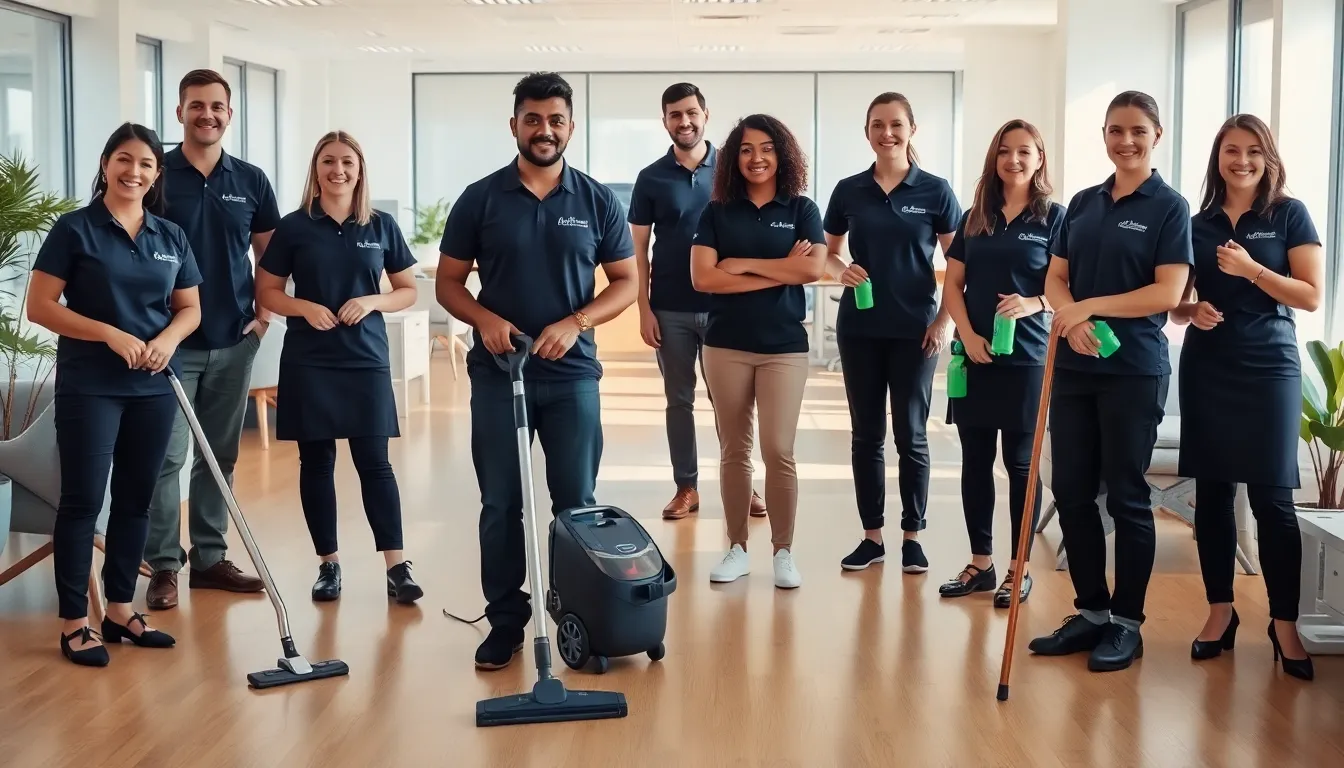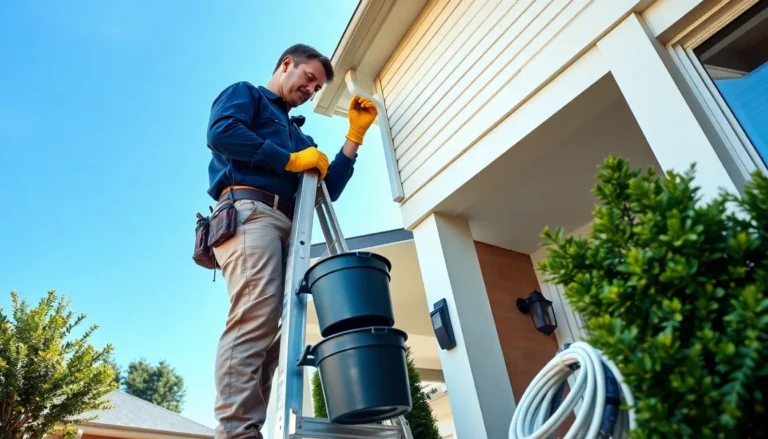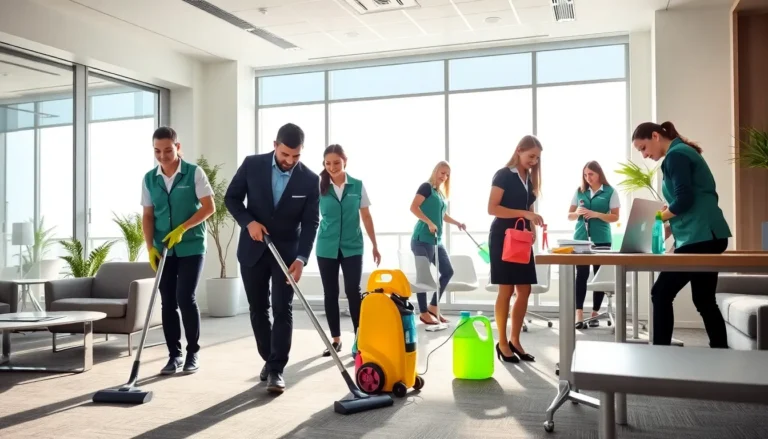Have you ever walked into a spotless office or a gleaming hotel room and wondered about the invisible superheroes behind that cleanliness? Spoiler alert: it’s not magic, it’s professional cleaning staff. In today’s fast-paced world, hiring experts to handle the nitty-gritty is no longer a luxury but a necessity. Whether it’s sweeping up crumbs from a busy cafeteria or ensuring that your workplace sparkles like it just won a prize, these individuals are essential. Let’s jump into why they matter, what they do, and how they shape our environments.
Table of Contents
ToggleWhy Hiring Professional Cleaning Staff Is Essential

When it comes to maintaining hygiene and aesthetics, hiring professional cleaning staff is crucial. Think about it: can one individual truly keep a bustling office or a large facility spotless amid daily chaos? The answer is a resounding no.
Professional cleaning staff not only save time but also enhance productivity. Employees focused on their tasks rather than cleaning duties can lead to a more efficient workplace. Also, cleanliness impacts morale. A tidy space fosters a positive environment, making employees feel valued and comfortable.
Also, consider health implications. Viruses and bacteria thrive in unclean environments. By employing professionals, businesses ensure thorough disinfecting practices that reduce illness and absenteeism. So not only does cleanliness improve productivity, but it also decreases healthcare costs related to sick leave.
Factor in the potential damage an unkempt environment can cause: from health, safety, to even property damage, the stakes are high. Hence, investing in professional cleaning staff is not just an expense, it’s a wise financial decision.
Key Responsibilities of Cleaning Staff
The realm of professional cleaning extends far beyond just picking up trash and vacuuming floors. Cleaning staff has a variety of responsibilities designed to maintain and enhance the cleanliness and safety of their workplaces.
- Daily Cleaning Tasks: This includes dusting, sweeping, mopping, and making sure restrooms are impeccably clean. Daily tasks are essential for areas with high foot traffic, such as offices and schools.
- Deep-Cleaning Duties: Scheduled deep cleaning focuses on hard-to-reach areas and surfaces that require more than the usual daily upkeep. Think windows, carpets, and upholstery.
- Sanitization: Considering recent events, maintaining sanitized environments has become paramount. Cleaning staff are trained in effective sanitization procedures that concentrate on high-touch surfaces, ensuring a safer space.
- Organizing Supplies: They manage cleaning supplies and equipment efficiently. When supplies run low, it’s the cleaning staff who ensure that replacements are ordered promptly.
- Compliance with Health Regulations: Especially in healthcare settings, cleaning staff need to be familiar with and adhere to professional hygiene standards and regulations. This professionalism keeps environments safe for both workers and clients.
Types of Cleaning Staff Roles
The world of cleaning offers a variety of roles, each contributing to a cleaner, healthier environment. Here are some common types of cleaning staff roles:
- Janitorial Staff: Often found in commercial buildings, their job encompasses all aspects of cleaning, including floors, restrooms, and common areas.
- Housekeepers: Typically employed in hotels and residential homes, homekeepers ensure living spaces are welcoming by tidying, laundry, and more.
- Specialized Cleaners: These are professional cleaners with specific expertise in areas such as carpet cleaning, window washing, or industrial cleaning, often requiring more training.
- Supervisors: They manage teams of cleaners, ensuring that cleaning schedules are met and that staff follows protocols effectively.
- Disinfection Specialists: With increased focus on hygiene, these individuals specialize in sanitizing, especially in environments such as hospitals or labs.
Qualifications and Skills of Effective Cleaning Staff
What makes an ideal cleaning staff member? While having a thorough understanding of cleaning methods is vital, several qualifications and skills enhance their effectiveness:
- Attention to Detail: Exceptional cleaning staff keep a keen eye for cleanliness. They notice intricate spots others might miss.
- Time Management: Balancing various tasks within a limited time frame is a must. Effective cleaners prioritize their responsibilities efficiently.
- Physical Stamina: Cleaning is a demanding job. Staff often find themselves on their feet for long periods, managing heavy equipment, which requires physical endurance.
- Trustworthiness: As cleaning staff often work in private spaces or during off-hours, trust is paramount. Employers value staff who use discretion and respect property.
- Adaptability: Every facility has different needs and cleaning protocols that may require staff to adapt quickly.
Challenges Faced by Cleaning Staff
Cleaning staff face a variety of challenges on the job, which can impact their well-being and job satisfaction.
- Exposure to Chemicals: Many cleaning products contain powerful chemicals which can have lasting health effects. Proper training and safety gear are essential to mitigate risks.
- Workplace Safety: Cleaning in various environments often poses risks. Slippery floors, sharp objects, and heavy lifting require attention to prevent injuries.
- Varied Working Hours: Often, these professionals work odd hours, including early mornings or late nights. Such schedules can disrupt work-life balance.
- Public Interaction: Dealing with the public can be tricky. Some may not understand the cleaning staff’s role, leading to misunderstandings or disrespect.
- Job Security: Cleaning positions often have a high turnover rate. This uncertainty can create a lack of job security, prompting staff to seek more stable opportunities.
The Future of Cleaning Staff in a Changing Landscape
As industries evolve, so do the roles and responsibilities of cleaning staff. Technology is playing an increasing role in reshaping the cleaning sector.
- Automation and Robotics: Innovative cleaning technologies, like robotic vacuums, are becoming more common, but they will never eliminate the need for human staff.
- Green Cleaning: A shift towards environmentally friendly products and practices marks a growing trend. Cleaning staff will need new training to adapt to these eco-conscious shifts.
- Continued Education: With an emphasis on safety and health, training programs will evolve, focusing on sanitation techniques and the proper use of new cleaning materials.
- Increased Demand: Public awareness of hygiene has skyrocketed, leading to greater demand for cleaning services across various sectors. This will likely enhance job opportunities in the near future.






